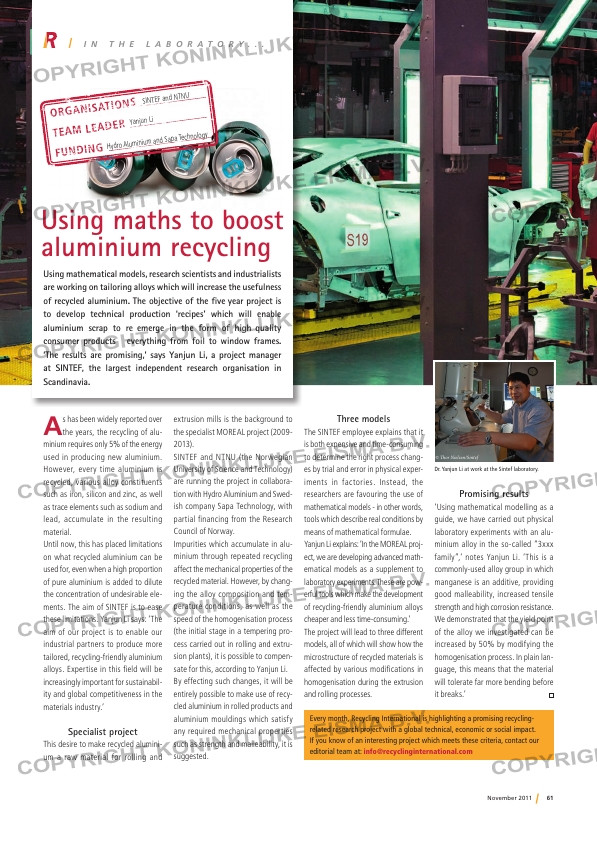Page 61 from: November 2011

61November 2011
I N T H E L A B O R A T O R Y . . .
Promising results
‘Using mathematical modelling as a
guide, we have carried out physical
laboratory experiments with an alu-
minium alloy in the so-called “3xxx
family”,’ notes Yanjun Li. ‘This is a
commonly-used alloy group in which
manganese is an additive, providing
good malleability, increased tensile
strength and high corrosion resistance.
We demonstrated that the yield point
of the alloy we investigated can be
increased by 50% by modifying the
homogenisation process. In plain lan-
guage, this means that the material
will tolerate far more bending before
it breaks.’
Every month, Recycling International is highlighting a promising recycling-
related research project with a global technical, economic or social impact.
If you know of an interesting project which meets these criteria, contact our
editorial team at: [email protected]
As has been widely reported over the years, the recycling of alu-
minium requires only 5% of the energy
used in producing new aluminium.
However, every time aluminium is
recycled, various alloy constituents
such as iron, silicon and zinc, as well
as trace elements such as sodium and
lead, accumulate in the resulting
material.
Until now, this has placed limitations
on what recycled aluminium can be
used for, even when a high proportion
of pure aluminium is added to dilute
the concentration of undesirable ele-
ments. The aim of SINTEF is to ease
these limitations. Yanjun Li says: ‘The
aim of our project is to enable our
industrial partners to produce more
tailored, recycling-friendly aluminium
alloys. Expertise in this fi eld will be
increasingly important for sustainabil-
ity and global competitiveness in the
materials industry.’
Specialist project
This desire to make recycled alumini-
um a raw material for rolling and
Three models
The SINTEF employee explains that it
is both expensive and time-consuming
to determine the right process chang-
es by trial and error in physical exper-
iments in factories. Instead, the
researchers are favouring the use of
mathematical models – in other words,
tools which describe real conditions by
means of mathematical formulae.
Yanjun Li explains: ‘In the MOREAL proj-
ect, we are developing advanced math-
ematical models as a supplement to
laboratory experiments. These are pow-
erful tools which make the development
of recycling-friendly aluminium alloys
cheaper and less time-consuming.’
The project will lead to three different
models, all of which will show how the
microstructure of recycled materials is
affected by various modifi cations in
homogenisation during the extrusion
and rolling processes.
extrusion mills is the background to
the specialist MOREAL project (2009-
2013).
SINTEF and NTNU (the Norwegian
University of Science and Technology)
are running the project in collabora-
tion with Hydro Aluminium and Swed-
ish company Sapa Technology, with
partial fi nancing from the Research
Council of Norway.
Impurities which accumulate in alu-
minium through repeated recycling
affect the mechanical properties of the
recycled material. However, by chang-
ing the alloy composition and tem-
perature conditions, as well as the
speed of the homogenisation process
(the initial stage in a tempering pro-
cess carried out in rolling and extru-
sion plants), it is possible to compen-
sate for this, according to Yanjun Li.
By effecting such changes, it will be
entirely possible to make use of recy-
cled aluminium in rolled products and
aluminium mouldings which satisfy
any required mechanical properties
such as strength and malleability, it is
suggested.
Using maths to boost
aluminium recycling
Using mathematical models, research scientists and industrialists
are working on tailoring alloys which will increase the usefulness
of recycled aluminium. The objective of the five year project is
to develop technical production ‘recipes’ which will enable
aluminium scrap to re emerge in the form of high quality
consumer products everything from foil to window frames.
‘The results are promising,’ says Yanjun Li, a project manager
at SINTEF, the largest independent research organisation in
Scandinavia.
ORGANIS
ATIONS
TEAM LEA
DER
FUNDING
SINTEF and N
TNU
Yanjun Li
Hydro Alumin
ium and Sapa
Technology
Dr. Yanjun Li at work at the Sintef laboratory.
© or Nielsen/Sintef
p0 1_ n t e o to .indd 1 07-11-11 10:3



